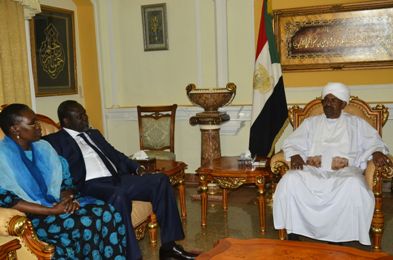Machar says Bashir could play major role in resolving South Sudan’s conflict
August 10, 2014 (KHARTOUM) – South Sudan’s former vice-president and leader of rebel faction SPLM in Opposition, Riek Machar, has met with Sudanese president Omer Hassan al-Bashir in Khartoum.

He further hailed president Bashir, saying that he has long experience which could be tapped in resolving the South Sudanese crisis particularly as he was the president of the unified Sudan before South Sudan’s cessation in 2011.
“Bashir could play major and direct role in resolving the crisis,” he added.
The rebel leader said he briefed Bashir on the developments of the ongoing talks between the two warring parties in Addis Ababa besides their vision for ending the dispute.
The official Sudan news agency (SUNA) reported that Bashir reiterated his support to the efforts exerted by the IGAD to reach a peaceful settlement to the South Sudanese conflict and encouraged the warring parties to resort to dialogue.
Speaking about the slow-moving peace process, he acknowledged that talks are facing significant obstacles but stressed the two sides have agreed on the negotiations agenda.
Machar expected that talks between his faction and the government would go beyond the 60-day ultimatum set by mediators from the East African regional bloc (IGAD), underscoring keenness to resolve the contentious issues and achieve peace in South Sudan.
The rebel negotiating team earlier this month demanded to limit the direct talks to the warring parties saying the political parties including the SPLM-detained leaders and civil society groups would participate in a consultative manner particularly when it comes to the negotiations on formation of a transitional government of national unity.
Machar rejected pressures exerted by some actors in the international community to form a transitional government in South Sudan before reaching a peace agreement.
“We told the international community and the IGAD that the agreement must precedes formation of a transitional government because the latter needs a program to be implemented and no government could be formed before signing any agreement,” he emphasised.
Machar added they wanted to negotiate directly with the government and consult with the stakeholders but IGAD insisted on forming a committee for negotiations through a roundtable, saying we agreed to participate in the talks but it will continue for a long time.
The rebel leader further said his talks with Bashir also tackled the issue of the South Sudanese refugees in Sudan, pointing his visit to Khartoum comes within the framework of a regional tour to IGAD countries and also because of the strong ties and common history between the two countries.
Machar’s spokesperson James Gatdet Dak had earlier told Sudan Tribune that the IGAD-facilitated the visit is in the interests of the peace process to end the crisis in South Sudan.
Machar who resides in the Ethiopian capital, Addis Ababa, the venue of the peace talks for several months was also received in Nairobi, Djibouti, and Pretoria, respectively. He also met with the president of South Africa, Jacob Zuma.
Sudan’s foreign minister, Ali Karti, last week announced that the South Sudanese former vice-president would be in Khartoum soon, adding that his visit comes in the framework of regional efforts to bring peace in the southern neighbouring country which broke away from Sudan in July 2011.
The crisis sparked off on 15 December when internal conflict between politicians in the ruling party turned violent.
Tens of thousands have been killed and at least 1.5 million others displaced according to estimates by the United Nations.
In May, both parties to the conflict vowed to bring an end to the fighting and agreed to establish a transitional government of national unity within 60-days. On the eve of the agreed date, however, disagreement at the talks make this commitment seemingly impossible to achieve.
The rebel group’s delegation, which participated in the opening of the fifth session of the talks on Monday, refused to attend the Tuesday round-table negotiations which directly included all the other stakeholders.
They reminded the mediation that the direct talks would be between their delegation and the government with the other stakeholders to participate only in a consultative manner.
(ST)
